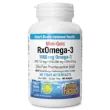Finding the Sweet Spot: Determining the Optimal Omega-3 Dose for Lowering Blood Pressure

Key Takeaways
Benefits of Omega-3 for blood pressure:- Reduces Blood Pressure: Omega-3 fatty acids, especially EPA and DHA, can lower blood pressure.
- Improves Heart Health: Helps reduce the risk of heart disease and improve cardiovascular health.
- Recommended Dosages: Highlights the importance of appropriate dosages for maximum benefit.
- Consult Healthcare Professionals: Advises consulting with a healthcare provider for personalized guidance.
Article by Arnie Gitomer Dec 25, 2023
High blood pressure is a common condition that affects millions of people worldwide. It can lead to serious health complications like heart disease, stroke, and kidney damage. Fortunately, research has shown that the right dose of omega-3 lowers blood pressure levels.
In this blog post, we will dive deep into understanding what Omega-3 fatty acids are, their impact on blood pressure, and how much you need to consume to reap their benefits. So, keep reading if you want to lower your blood pressure with a simple solution.
Understanding How Omega-3 Lowers Blood Pressure
Omega-3 fatty acids, such as eicosapentaenoic acid (EPA) and docosahexaenoic acid (DHA), have been extensively studied for their proven health benefits. Research suggests these essential fatty acids can help lower blood pressure, making them crucial for overall heart health. You may improve blood pressure control by incorporating omega-3s into your diet through dietary supplements or food sources.
The Health Benefits of Omega-3 Fatty Acids
Research has shown that omega-3 essential fatty acids can reduce the risk of coronary heart disease and have anti-inflammatory properties. They can also improve lipid levels and lower triglycerides, contributing to cardiovascular health. Omega-3s may lower the risk of atherosclerosis, a condition characterized by the hardening and narrowing of arteries.
How Omega-3 Lowers Blood Pressure: The Science Behind It
Omega-3s have been extensively studied for their impact on blood pressure. Research has shown that these essential fatty acids can lower both systolic and diastolic blood pressure, the top and bottom numbers when measuring blood pressure. One way omega-3s achieve this is by relaxing blood vessels, which improves blood flow. Additionally, omega-3s may reduce inflammation, a factor known to contribute to hypertension. These fatty acids also improve heart rate variability, an important marker of cardiovascular health.
How Much Omega-3 Do You Need To Lower Blood Pressure?
The American Heart Association recommends consuming 1-2 servings of fatty fish per week to lower blood pressure. If fish isn't your thing, omega-3 supplements can be an alternative. Clinical trials have shown that a daily dose of 2-4 grams of omega-3s effectively lowers blood pressure, but the optimal dose may vary based on individual factors and the severity of hypertension.
Do All Individuals Respond the Same to Omega-3?
Individual response to omega-3 supplementation can vary based on factors like age, genetics, and overall health. Some may experience a more significant reduction in blood pressure than others, so regular monitoring and personalized recommendations from healthcare professionals are important for optimal results.
Key Studies Supporting the Benefits of Omega-3 in Hypertension Management
Several key studies have provided strong evidence showcasing how omega-3 lowers blood pressure. One meta-analysis encompassing 70 clinical trials found that omega-3 supplementation leads to a significant reduction in blood pressure. Another study published in the Journal of Nutrition established an inverse association between omega-3 intake and blood pressure levels. The American Journal of Hypertension also published research highlighting the modest yet significant effect of omega-3s on blood pressure. Furthermore, a study carried out in China observed a noteworthy decrease in blood pressure with omega-3 supplementation.
Safety Concerns: Is There Such a Thing as Too Much Omega-3?
While omega-3 supplements are generally safe at recommended doses, high doses may increase the risk of bleeding in some individuals. It's important to follow dosing instructions and consult with a healthcare professional. The FDA has set guidelines for maximum daily intake of omega-3s from supplements.
Possible Side Effects of Excessive Omega-3 Intake
Excessive intake of omega-3s can result in gastrointestinal issues, such as diarrhea and indigestion. Some individuals may also experience an unpleasant aftertaste or fishy burps when consuming omega-3 supplements. It is important to note that excessive omega-3 intake could lead to vitamin E deficiency or interfere with blood clotting. If you encounter any adverse effects while taking omega-3 supplements, it is advisable to consult with a healthcare professional.
Food Sources vs Supplements: Which is Better for Omega-3 Intake?
While consuming omega-3-rich foods provides a natural and balanced source of nutrients, fish oil supplements offer a convenient way to ensure sufficient intake. Including fatty fish like trout and herring in your diet can boost omega-3 levels while giving you the benefit of a balanced diet.
On the other hand, fish oil supplements offer a concentrated source of omega-3 fatty acids, which have been shown to reduce the risk of coronary heart disease. These supplements can be a convenient way to ensure sufficient intake of these beneficial fats. It's also worth mentioning that while fish oil supplements are widely available as dietary supplements, they should not replace a healthy and balanced diet rich in omega-3s from natural food sources like fatty fish.
Conclusion
Omega-3 lowers blood pressure, but it is important to determine the optimal dose. Research indicates that Omega-3 fatty acids, specifically DHA and EPA, significantly reduce hypertension. However, the response to Omega-3 intake may vary among individuals, and it is crucial to consult with a healthcare professional to determine the appropriate dosage. It is also worth mentioning that some individuals may experience side effects when taking omega-3 fatty acids. You can reduce your risk of experiencing side effects by consulting with your doctor before taking supplements and sticking to the recommended dose. Consuming fatty fish regularly in your diet is also a great way of getting omega-3s without supplementation.
If you are looking for high-quality supplements for your blood pressure, contact us today at Willner Chemists to view our extensive supplement catalog.
 |
Read more about Arnie Gitomer |
Product Search Results

|
Omega 3 Rx Ultra One A Day | Natural Factors | $28.76 | 69066 |

|
Omega Ultimate | Nordic Naturals | Login for Price | 50093 |
